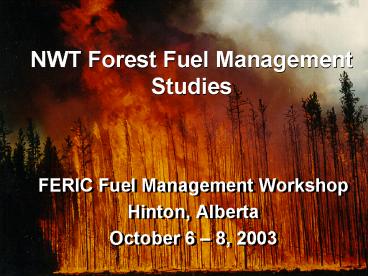NWT Forest Fuel Management Studies - PowerPoint PPT Presentation
1 / 34
Title: NWT Forest Fuel Management Studies
1
NWT Forest Fuel Management Studies
- FERIC Fuel Management Workshop
- Hinton, Alberta
- October 6 8, 2003
2
An exciting new breakfast cereal.
3
Bark flakes, ignited by the flaming zone and
ripped from the trees with gale force winds,
produce massive ember fallout several meters
ahead of the leading edge of the crown fire.
4
In-stand video from the International Crown Fire
Modelling Experiment Steve Taylor (CFS)
5
Fire Guards Breached by Spotting from every
experimental burn plot
6
Spotting distances ranged 200 300 m
7
Aspen bark has fewer potential ember sources
compared to jack pine
8
Aspen Plot - June 17, 1999
9
- FFMC 94.5
- Wind Speed 12 km/h
- ISI 17
10
Structure Survival Study
Wall sections are 2.4 x 2.4 metres and covered
with exterior plywood. The roof and enclosed
eave section are covered with oriented strand
board (OSB) with a primed composition board
fascia.
11
Flame bathing in the 10-m defensible space
12
10 meters
Ave total heat flux (kW/sq m)
Ave FTP integral
Minimum for ignition
13
Plot I1- June 18, 1999
14
Roof Test
Plot I1 House Fire June 25, 2000
15
Siding Test
Plot I1 House Fire June 25, 2000
16
Fully Involved
Plot I1 House Fire June 25, 2000
17
House Fire Fails to Ignite Forest
Plot I1 House Fire June 25, 2000
18
To test the recommendation, scientists split a
150-sq.-metre plot of trees in half, leaving on
half untouched and treating the other half
according to the FireSmart guide. They placed
bets on how much slower flames would travel
through the treated section. Rick Lanoville, the
NWTs manager of forest sciences, bet it would
travel half as fast. He and everyone else who
wagered lost. It was an absolute failure, he
said. It didnt affect the spread at all. The
fire crowned just as readily in the treated area
as it did in the untreated, and spread about the
same speed if not a little faster.
Edmonton Journal August 21 2003
19
TREATED/ UNTREATED PLOT
- UNTREATED
- Pine Overstory
- Spruce Understory
- TREATED
- Pine Overstory
- Pruned Thinned to 2 m
- Down Dead Wood Removed
20
Treated/Untreated Plot - June 14, 2000
21
The treated portion developed a sustained crown
fire rapid rate of spread about the same as the
untreated portion
22
New Insights into the Effectiveness of Fuel
Reduction Treatments at the Stand Level
Judi Beck B.C. Forest Service Victoria, British
Columbia
Rick Lanoville GNWT Forest Management
Division Fort Smith, Northwest Territories
Marty Alexander Chris Stefner Canadian Forest
Service Edmonton, Alberta
Glenda Holloway B.C. Forest Service Victoria,
British Columbia
23
In theory, fuel treatments are designed to reduce
fire intensity and rate of spread thereby
lessening the chances of a conflagration
developing.
24
Nonetheless, thinning and pruning treatments open
up a stand, and result in increased within stand
wind speeds and faster fuel drying rates.
25
These changes in the fire environment may, in
fact, counteract some of the positive effects
fuel reduction treatments have on potential fire
behavior.
26
Drier and windier burning conditions presumably
increases the probability of crown fire
initiation in spite of the fact that the
effective crown base height has been increased.
27
Community Fire Project
18 75m x 75m Fuel Treatment Plots
28
Plot 7
Mature jack pine 75m by 75m 10-m guards
7
Fuel Treatment Plot Layout
29
Plot 7 South Side
30
Plot 7 West Side
31
Plot 7 North Side
32
Plot 7 East Side
33
One of the first results from burning the control
plots in the fuel treatment experiments will test
the equivalent of removing the black spruce
understory from the crown fire experiment fuel
type.
34
For more information visit the ICFME web site
at http//nofc.cfs.nrcan.gc.ca/fire/frn/nwt/































